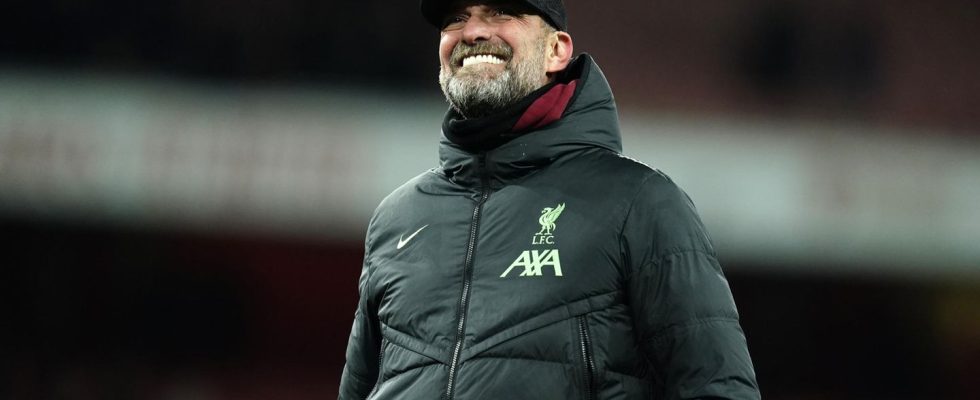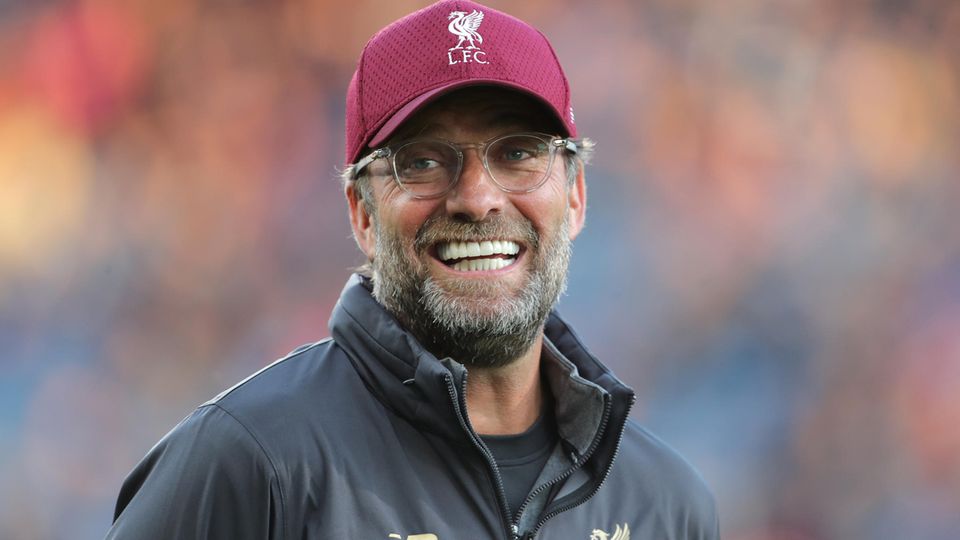Jürgen Klopp is leaving Liverpool at the end of the season – at the peak of his creativity. This is not good news for some coaches in Europe. Not even for Thomas Tuchel and Julian Nagelsmann.
Hardly anything in football is as important as the feeling for the right moment. When to shoot? When is it better to fit again? When should you start a tackle without hitting your opponent’s legs? Footballers often make decisions like this within milliseconds. They determine whether you win or lose.
Jürgen Klopp was never a great footballer, more of a roughneck, but as a coach he has a feel for the right moment like no other. Whatever happens on the pitch: Klopp knows a solution. He can rely on his reflexes, his ideas, his intuition. There may be greater strategists than him, Pep Guardiola or Carlo Ancelotti for example, but when it comes to coaching during the so-called crunch time, the phase in which games come to a head, Klopp towers above them all.
Klopp, the last of his kind in world football, has come a long way with his gut feeling for the game: he led Borussia Dortmund, which had long had to fight for economic survival, out of the emotional bottom of the table and made the team German champions in 2011 and 2012. Things were similar at Liverpool FC. When Klopp took over there in October 2015, the club was nothing more than a shell. A big name without a presence, the good times were ages ago, in the 80s and before. Klopp came and took the whole club with him. Liverpool won the Champions League in 2019 and the English championship in 2020 – the club’s first in 30 years. Today there is a statue of Klopp in front of the stadium on Anfield Road. A monument during your lifetime, who can manage that?
What Klopp, the emotional man, was missing for a long time was the sense of ending things in the moment. To feel when it would be better to leave because something has worn out in the relationship between him, the club and the team.
That’s how it was in Dortmund in 2015. Klopp, who had won the Supercup with BVB the season before, suddenly found himself in a relegation battle with his team. Klopp’s sayings, his speeches, his wit – for many in the club they suddenly sounded stale and meaningless. The Klopp principle had outlived itself, but he himself noticed it late and only left in the summer of 2015.
Klopp achieves a resurrection with Liverpool
Klopp has learned from this mistake. He is leaving Liverpool at the end of the season, as he announced in a video message via X on Friday. Everything suggests that the timing is right this time: Klopp is not leaving in a moment of weakness, but at the full height of his creative potential. The team is leading the Premier League and is top of its Europa League group – it’s something of a resurgence after a weak previous season.
Klopp will leave behind a young, promising Liverpool FC this summer. And not a construction site like in Dortmund. Klopp himself reorganized the team after the great depression that followed the championship year.
Klopp’s football has always required a lot of energy, and the heroes of the title years in 2019 and 2020 had aged quickly. At some point it seemed as if they could no longer keep up with the pace that Klopp was demanding. As if the coach had worn the team out with his intense style of play. In May 2023, the club finished the league season in fifth place. It seemed as if Liverpool were slowly regressing, into the upper midfield of the league – where Klopp had once taken over the club.
Klopp invents “Liverpool 2.0”
In the midst of this period of relegation, Klopp did the opposite of what many expected him to do: he renewed his contract at Liverpool. Klopp wanted to send a signal of departure. He didn’t want to leave the club in an impending crisis. He wanted to reinvent Liverpool a second time. Klopp, who has always had a penchant for slogans, proclaimed a “Liverpool 2.0”. Last summer he rebuilt the squad. He almost completely replaced the aging midfield. Klopp allowed regulars like Fabinho and Jordan Henderson, once the heart of the team, to move to Saudi Arabia. He didn’t complain much about the Saudis tearing his team apart with obscenely high offers. He saw this as an opportunity to give the team a new face. In addition to the experienced Wataru Endō from VfB Stuttgart, Klopp primarily signed younger, promising midfielders such as Dominik Szoboszlai from RB Leipzig, Ryan Gravenberch from FC Bayern and Alexis Mac Allister from Brighton. There was skepticism around the club. Should the new beginning be successful with these players? Weren’t there some big names missing?
But Klopp has rarely bought celebrities. He usually made big names out of his players. And this time too his plan seems to be working.
Klopp will leave behind a rich legacy. He managed to transform the identity of the former workers’ club into a playing philosophy. His players should chase the ball. He turned strikers into offensive defenders. His credo was: Attack when you have the ball at your feet. Attack when you have lost the ball. He called this “organized chaos.” Klopp wanted no other team in Europe to play more intense football than Liverpool. And over several years, the team has come very close to his vision.
Klopp’s name will haunt the leagues
Klopp will be back on the market in May this year. This is not good news for many coaches in Europe. From today on, Klopp will be roaming the leagues as a shadow coach. Will FC Bayern still have a lot of patience with Thomas Tuchel if Klopp is available soon? Things are also likely to get restless in Paris, this infinitely rich but uncrowned upstart. Why not let Luis Enrique go and get Klopp, who knows how to win the Champions League? Or Barcelona: wouldn’t a relaunch be necessary there too? The revival of an old brand? Or, more obvious, the German national team? What if she loses her two friendlies against the Netherlands and France in March? Will Jürgen Klopp be in the dugout at the home European Championship in the summer and not Julian Nagelsmann?
Quite conceivable. Jürgen Klopp will let this all pass him by. At least for now. He’s still in Liverpool, and he wants to prove once again that he’s not just a giant as a bronze statue.


